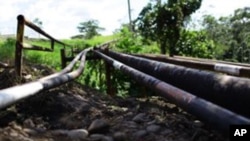Ecuador’s decision to forego potentially lucrative oil drilling in the Amazon forest in order to protect a biologically rich and fragile ecosystem is the focus of two documentaries at the Washington Environmental Film Festival.
The decision represents a huge sacrifice for a small South American country which earns half its export revenues from oil.
In 2007, Ecuadorian President Rafael Correa boldly halted operations at one of the country’s most promising wells. That amounts to 25 percent of Ecuador’s known oil reserves, which works out to about 846 million barrels of crude. The oil sits below Yasuni National Park, one of the most biologically diverse places on the planet.
'Two Seconds of Life'
In return Ecuador wants compensation, says Leonardo Wild, an American-born filmmaker who lives in Ecuador. The story unfolds in his documentary, "Two Seconds of Life”" Every two seconds, one hectare of Amazon rainforest is lost. That’s where the film gets its name.
"If you say Ecuador’s idea is to make $7 billion with the oil profits, they say the world should give half of that or 3.5 billion and Ecuador would give the other 3.5 (billion) by leaving the oil in the ground."
A trust fund has already been set up by the United Nations to manage any money that world governments decide to donate to compensate Equador for leaving oil in the ground. Those funds would be spent on projects that address global warming, deforestation, biodiversity and the alleviation of poverty among Ecuador’s indigenous people.
In "Two Seconds of Life," we see what’s at stake as we move deep into the rainforest with Waorani Indian guide Penti Bahira, whose ancestors have lived here for more than 1,000 years.
Judea Lawton, a Washington resident, watched the film at the Ecuadorian Embassy. "We’ve had enough of money and exploitation being the basis for what we do. We need to preserve mother earth and we need to preserve the cultures of people who have been here for thousands of years. I think it is a really important initiative."
'A Future Without Oil'
Ecuador’s plan not to exploit oil requires support from the global community. In "A Future without Oil," French filmmaker Laetitia Moreau joins the Ecuadorian negotiators as they seek partners in Europe and the United States. She says it is not an easy sell.
"There are moments in the negotiations," she says, "that you really feel how difficult it is for a small country to put forward a breakthrough idea on the international stage."
The team sees promise in Norway. The Scandinavian country has offshore oil reserves and invests heavily in reforestation. Moreau says the Ecuadorians are confident that they have common interests, but they leave empty-handed and disappointed.
"They get a cold diplomatic reception for the idea. That was a hard blow for the Ecuadorian team because they came with a lot of enthusiasm."
Hard sell
The movie proceeds like a boxing match, with rounds fought in Germany, Belgium, Spain and the United States. As negotiators face a deadline to close the deal, they struggle to convince foreign governments to invest. Moreau hopes the documentary helps filmgoers understand that the Ecuadorian initiative represents a vision of a future without oil.
"I want people who see the movie to think about all these problems in a different way and what Ecuador is doing is an out of the mold energy solution."
Tom McGlynn was among some 200 people who watched the movie at a World Bank screening in Washington. He supports the initiative, but sees an obvious roadblock. "The global economies are in such rough straights right now, it is a challenge to get people to pony up the funds to do this when everyone is in deficit spending right now."
Even if his country’s proposal fails to attract sufficient funds right now, the Ecuadorian ambassador to the United States argues that Ecuador has already set an example that other nations can follow.
"That we, as all Ecuadorians, are very respectful of nature," says Luis Gallegos, "very respectful of what comes with nature and the responsibility of people must have in preserving and conserving and making a sustainable environment."
The Correa government in Ecuador will evaluate the initiative at the end of the year and then make a decision on whether or not to proceed with oil drilling in the Amazon.















